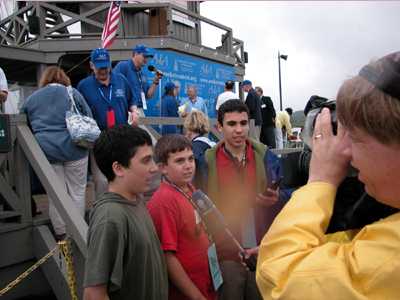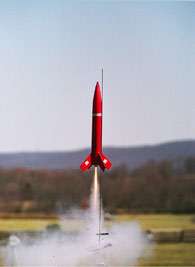Sun, May 11, 2003
Well, An Aspiring One Anyway
The sounds of rockets sizzling through the sky mixed with the
cheering of hundreds of kids Saturday as 100 high school teams from
around the country competed for cash prizes and, more importantly,
recognition as winners of the nation's most challenging model
rocket contest.

At the end of the day, the team representing Boonsboro High
School from Boonsboro (MD) claimed the honor of a perfect score of
1500 feet - sharing a $59,000 prize pool with four other top
ranking high school teams from across the nation: Washington
International School from Washington (DC), Vail Christian High
School from Edwards (CO), Manlius Pebble Hill School in DeWitt
(NY), and Waccamaw High School from Pawleys Island (SC). US Senator
Michael B. Enzi (R-WY), National Aeronautics and Space
Administrator Sean O'Keefe, Author Homer Hickam, Marshall Space
Flight Center Director Art Stephenson, National Air and Space
Museum Director Jack Dailey and NASA astronaut Jay Apt were among
the dignitaries presenting awards to the top five teams.

Stiff Competition
About 750 students from 100 high schools brought their custom
designed model rockets to Great Meadow in The Plains (VA), having
qualified through regional fly-offs against nearly 800 other teams
around the country in the last few months. The contest requirements
were tough: Students had to build a two-stage rocket that could fly
to an altitude of 1,500 feet-no more, no less-release a payload of
two raw eggs, and parachute the eggs back to the ground
unbroken.
 The top 100 teams came from 36 states across the
nation, including the District of Columbia. Many of the teams'
travel expenses were paid for by AIA member companies and other
companies from their home towns.
The top 100 teams came from 36 states across the
nation, including the District of Columbia. Many of the teams'
travel expenses were paid for by AIA member companies and other
companies from their home towns.
Sponsored by the Aerospace Industries Association and the
National Association of Rocketry, the contest was created to
celebrate the 100th anniversary of flight, and to encourage
interest in aerospace design and engineering among high school
students. AIA President and CEO John W. Douglass said, "Everyone's
been saying that kids today aren't interested in space, but we
found that quite the contrary, kids are just as interested in space
today as they were 30 years ago. We started this contest as a way
to celebrate the 100th anniversary of powered flight and were
overwhelmed with the response we received from students all over
the country. We hope the young people here today have discovered
how fascinating science is and decide to study aerospace fields
when they go to college. That will be the ultimate measure of the
value of this contest."
More News
After Draining Both Wing Fuel Tanks, A Significant Amount Of Water Was Observed In The Right Wing Fuel Tank Analysis: The pilot, who was also the owner of the experimental amateur->[...]
“Airbus apologises for any challenges and delays caused to passengers and airlines by this event. The Company thanks its customers, the authorities, its employees and all rel>[...]
High Speed Taxiway A long radius taxiway designed and provided with lighting or marking to define the path of aircraft, traveling at high speed (up to 60 knots), from the runway ce>[...]
Aero Linx: Taylorcraft Foundation, Inc. The Taylorcraft Foundation is exclusively organized for charitable, educational & scientific activities and will preserve the history an>[...]
Also: USAF Reaper Accident, Baikonur Damage, Horizon eVTOL IFR/FIKI, New Glenn Update Honda has outlined its clearest timeline yet for its entry into the world of electric vertical>[...]
 NTSB Final Report: Patriot Aircraft LLC CX1900A
NTSB Final Report: Patriot Aircraft LLC CX1900A Aero-News: Quote of the Day (12.06.25)
Aero-News: Quote of the Day (12.06.25) ANN's Daily Aero-Term (12.06.25): High Speed Taxiway
ANN's Daily Aero-Term (12.06.25): High Speed Taxiway ANN's Daily Aero-Linx (12.06.25)
ANN's Daily Aero-Linx (12.06.25) Airborne-NextGen 12.02.25: Honda eVTOL, Arctus High-Alt UAS, Samson Patent
Airborne-NextGen 12.02.25: Honda eVTOL, Arctus High-Alt UAS, Samson Patent




